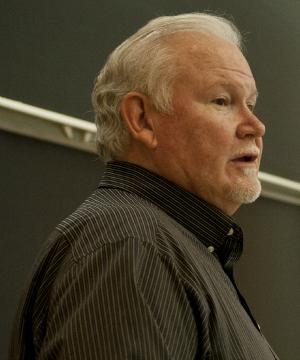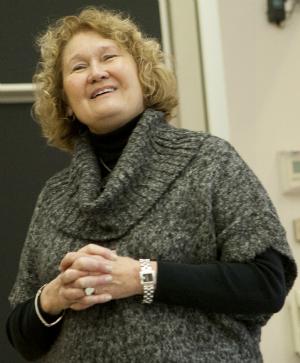Exercising Tribal Sovereignty
Native American Justices Talk About Tribal Courts' Jurisdiction
New York, March 1, 2013—Tribal courts have made progress in working with state and federal courts on the issue of jurisdiction, but there is still a long way to go, said the Hon. Barbara A. Smith, former chief justice and a current justice for the Chickasaw Nation. She and her brother, the Hon. Michael C. Smith, a judge for the Sac and Fox Nation, spoke about working between the court systems in a recent talk at Columbia Law School.
| The Honorable Michael C. Smith |
Michael Smith began the Feb. 19 discussion by pointing out that students could find a Native American aspect of nearly every area of law in which they might be interested. The pair discussed various requirements for students who decide to practice tribal law. For example, some tribal courts have separate bar exams while others accept members in good standing of any state bar so long as they pay a fee.
“The law has changed; courts are changing with the tribes’ economic development. They are expanding in many, many ways, many areas of the law,” Barbara Smith said. “So, for you, it’s just beginning.”
| The Honorable Barbara A. Smith |
The conversation then turned to tribes that are not federally recognized. Barbara Smith explained that some tribes remain federally unrecognized because it is “unnecessarily burdensome” to gain recognition.
Jurisdiction dominated the latter half of the discussion. One of the main issues tribal courts face is whether they can hear cases involving non-tribal members. In fact, obtaining jurisdiction over all litigants is the first hurdle to clear before a case can move forward, Michael Smith said.
State courts have become less resistant to tribal courts in part because relinquishing jurisdiction can take some of the burden off busy state court dockets.
“It’s about compromise and negotiation,” he said.
A tribe’s supreme court is the “final word” when tribal court decisions are appealed, according to Barbara Smith. But she said many states believe they should have appellate jurisdiction because the tribes exist within the states.
“There are some who believe that the [United States] Supreme Court should have tribal review,” she said. But the tribes are sovereign nations, she added. “President [Barack] Obama has been very, very clear that we are on a nation-to-nation relationship.”
| JoAnn Kintz ’14 |
Columbia Law School’s Native American Law Students Association President JoAnn Kintz ’14 organized the event and introduced the Smiths. Kintz plans to commit her legal career to working within the area of Federal Indian Law. Last summer, she worked at the Indian Law Resource Center in Helena, Montana, and this summer, she will be working at Fredericks Peebles & Morgan LLP, a Native American law firm in Louisville, Colorado.
The Columbia NALSA chapter is dedicated to promoting the study of Indian law and creating a Native American voice at Columbia. The group won last year’s award for Chapter of the Year from the National Native American Law Students Association.
The Smiths were at the Law School to speak with the Native Peacemaking seminar taught by Associate Clinical Professor of Law Alexandra Carter ’03 and Adjunct Professor Shawn Watts ’12. The Chickasaw Nation Court has a peacemaking initiative within its code as an alternative dispute resolution mechanism.


